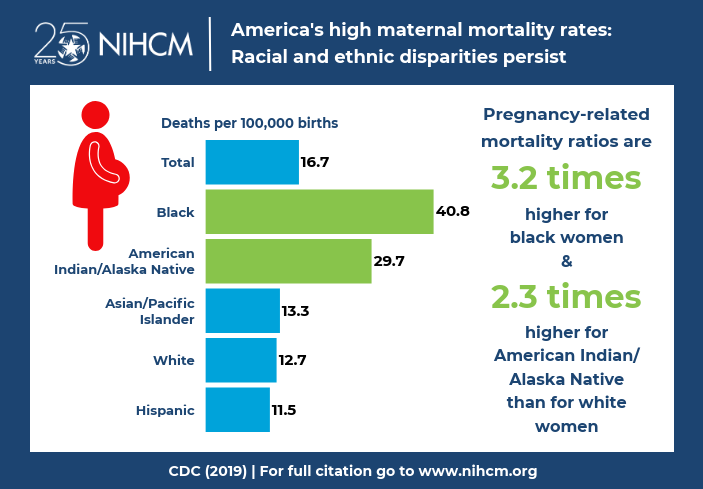NIHCM Newsletter / October 2019
The Maternal Mortality Crisis

Racial and ethnic disparities in maternal mortality rates persist over time and across age groups, according to new data from the Centers for Disease Control and Prevention regarding pregnancy-related deaths from 2007 to 2016. One strategy to address these disparities is to improve access to quality care. The Health Resources and Services Administration recently awarded $9 million to Missouri, New Mexico, and Texas to pilot, test, and develop new and innovative ways to improve access to obstetrics care in rural communities. In New Jersey, Horizon Blue Cross Blue Shield of New Jersey is collaborating with the state's largest health care system to address racial disparities in maternal and child health via the Advancing Health Equity: Leading Care, Payment, and Systems Transformation program.
When E-Cigarettes Aren't Safe: Alternate Approaches to Smoking Cessation
While electronic cigarettes have long been touted by manufacturers as a tool for smoking cessation, the multistate outbreak of lung injury associated with vaping raises new safety concerns. The CDC, the U.S. Food and Drug Administration (FDA), and state and local public health partners are investigating the causes of vaping illness, and the CDC recommends refraining from vaping in the interim.
Fortunately, alternate strategies to promote smoking cessation and prevent tobacco use are producing results. Health organizations are collaborating through public-private partnerships to help people quit smoking and to discourage cigarette use:
- More than 10,000 people quit smoking through the Smoking Cessation for Low-Income Housing Residents project, supported by the American Lung Association and Anthem Foundation.
- Early reports from the This Free Life public education campaign, supported by the FDA and Blue Cross and Blue Shield of Minnesota, show a decline in cigarette use among LGBTQ youth from 19 percent in 2016 to 11 percent in 2018.

NIHCM's Capitol Hill Briefing
Join us at NIHCM's upcoming Capitol Hill Briefing in Washington, D.C., on October 11 to hear health care leaders share their insights on how to build healthier communities, including:
- An update from CDC on their latest opioid overdose prevention efforts and new guidance on opioid prescribing
- Successful community-led partnerships to fight hunger in rural America and address the drivers of food insecurity
- State and local initiatives tackling the root causes of health inequities by redesigning health care delivery to meet social needs
Expanded Resources to Fight the Opioid Crisis
As state leaders continue to feel the emotional and financial burdens of the opioid crisis, the Substance Abuse and Mental Health Services Administration has announced $932 million in continued funding of the State Opioid Response grants to support states' efforts in prevention, treatment, and recovery of opioid use disorder. In many states, public and private sector leaders are launching new programs to raise awareness of the dangers of opioids and supplement federal prevention efforts:
- As part of the Opioid Risk Prevention Partnership, BlueCross BlueShield of South Carolina launched Perspectives, a video series that portrays the opioid crisis from the perspective of a first responder, a patient and a physician.
- The Partnership for a Drug-Free New Jersey and the Horizon Foundation for New Jersey are collaborating on a two-year Knock Out Opioid Abuse initiative focused on community outreach and prescriber and parent education.
- In Pennsylvania, Independence Blue Cross Foundation's Someone You Know campaign spreads public awareness about opioid addiction through storytelling.
Connecting Population Health to Value-Based Care
The purpose of value-based care is to move towards paying for care based on health outcomes, rather than paying for volume of services. A new strategic partnership between Navvis and SSM Health seeks to take value-based care a step further by developing a delivery model centered on population health, with a holistic focus to help patients manage their health throughout their lives.
More Related Articles
See More on: Maternal and Child Health | Social Determinants of Health
